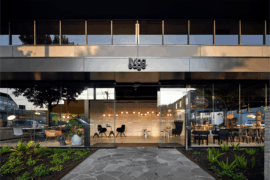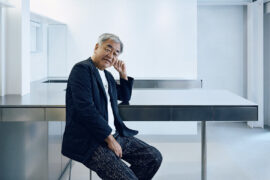Meet Jozef Youssef, the experimental chef of London’s famed Kitchen Theory, who uses science and design to change the way we perceive food.
Jozef Youssef wants to change the way we eat, using the psychology behind the way we experience food to make nutritional, sustainable food more appealing. He left a career as a chef at famed restaurants such as Heston Blumenthal’s The Fat Duck and The Connaught in 2011 to found Kitchen Theory, which he describes as creating engaging, multisensory gastronomy experiences that are driven by research conducted with Professor Charles Spence at Oxford University.
The idea is to translate aspects of the research into nine-course educational dinners, and to find ways to make us want to eat food that’s both good for us and for the environment – think cricket-filled brownies based on the finding that people are more open to entomophagy (the act of eating insects) with sweet, rather than savory, dishes.
“The research is the less flashy part of what we do, but it’s also the most important,” he says. “We test our ideas from the lab on real-life diners at our events. Obviously, we don’t treat them like lab rats, but we do try to collect little amounts of data to confirm research we’re doing in the lab.”
From dishes served with earplugs to surreal plates accompanied by a soundscape, it’s all part of Kitchen Theory’s mission to disrupt the traditional hospitality experience. In doing so, Youssef gives diners an alternative experience that takes them on a journey – and, along the way, teaches them something about how they perceive and understand the act of eating. It’s also a good excuse to play with your food.
Read more about Jozef Youssef and Kitchen Theory in issue #67 of Indesign magazine.
On sale November 17, subscribe here.
INDESIGN is on instagram
Follow @indesignlive
A searchable and comprehensive guide for specifying leading products and their suppliers
Keep up to date with the latest and greatest from our industry BFF's!

A curated exhibition in Frederiksstaden captures the spirit of Australian design

For Aidan Mawhinney, the secret ingredient to Living Edge’s success “comes down to people, product and place.” As the brand celebrates a significant 25-year milestone, it’s that commitment to authentic, sustainable design – and the people behind it all – that continues to anchor its legacy.

London-based design duo Raw Edges have joined forces with Established & Sons and Tongue & Groove to introduce Wall to Wall – a hand-stained, “living collection” that transforms parquet flooring into a canvas of colour, pattern, and possibility.

Architectus disrupts the traditional thinking around public and civic projects with an ‘accessible’ architectural vision for the Christchurch Bus Interchange.

What is interior design’s responsibility in revolutionising aged-care environments? The new Emmy Monash Aged-Care facility in Melbourne’s Caufield has all the luxury commodities of a contemporary multi-residential complex. From thoughtfully considered finishes through to superior shared facilities, no expense has been spared on residents’ comfort and quality of life.
The internet never sleeps! Here's the stuff you might have missed

Pier Pavilion by Besley & Spresser provides a refreshing, architecturally thoughtful and versatile public space by the water at Barangaroo.

In a wide-ranging interview, the iconic Japanese architect joins Timothy Alouani-Roby to discuss his childhood home, the influence of Metabolism, a formative experience in the Sahara desert and a recent house by Mount Fuji.